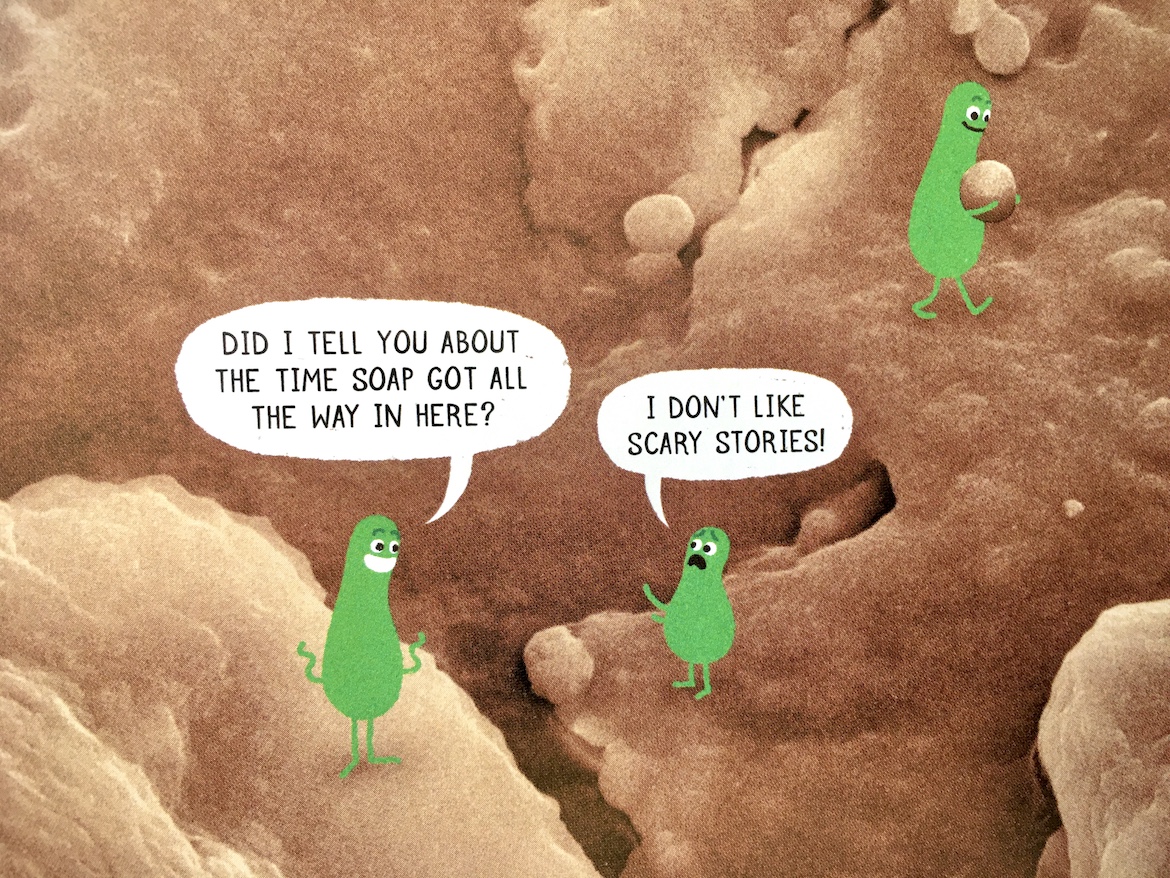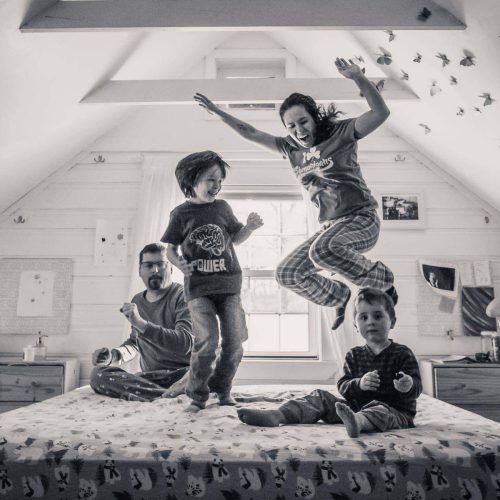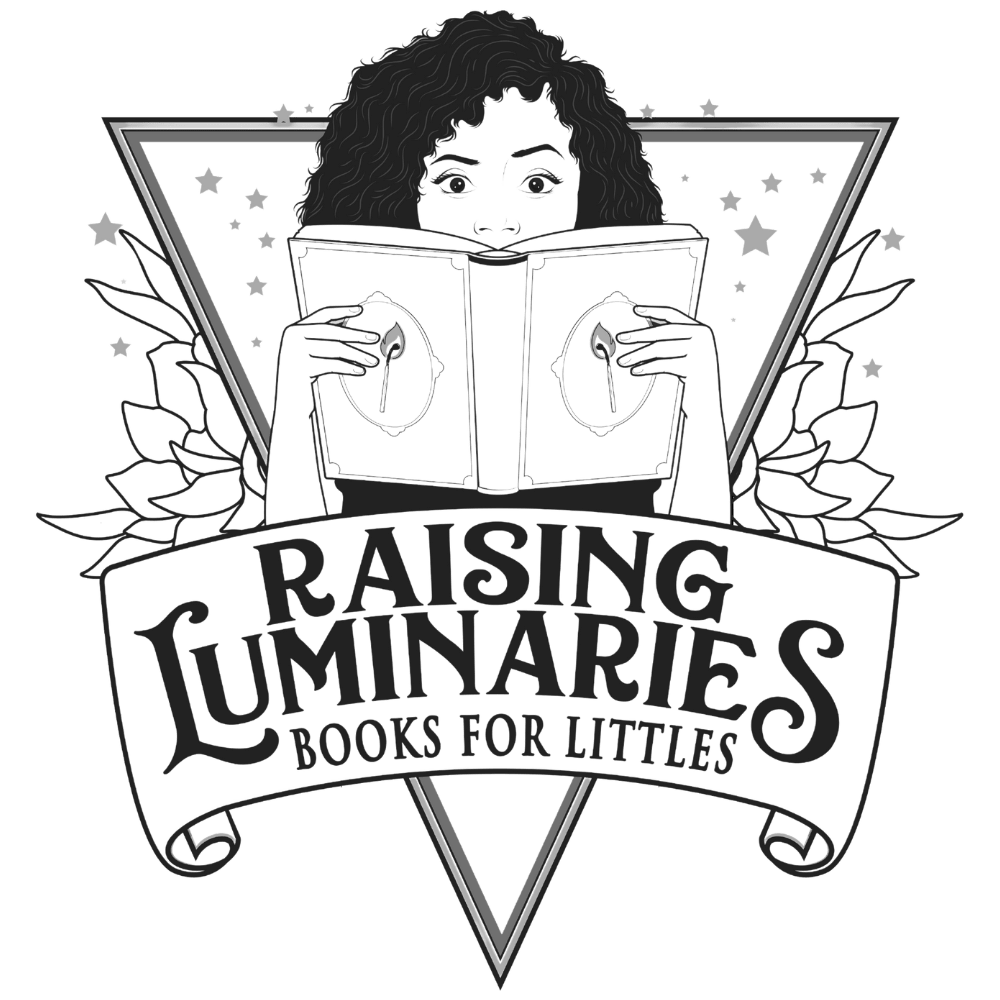Sharing this post on social media? Use this image description to make it accessible. [Image description: Illustration from ‘Do Not Lick This Book’ by Idan Ben-Barak & Julian Frost. Two cartoon corynebacterium living in a microscopic photo of belly button skin cells chat, “Did I tell you about the time soap got all in the way in here?” and the other says “I don’t like scary stories!“]
Keep Raising Luminaries & Books for Littles free and accessible for readers who can’t afford a paywall.
Posts may contain affiliate links, which allow me to earn a commission at no extra cost to you. Check out the full affiliate disclosure along with my statement of accountability. If you’re into supporting libraries (please do!) more than consumerism, you can also support my work directly:
Donate or shop using an affiliate link via| Paypal | Venmo | Ko-fi | Buy a t-shirt | Buy a book
Hand-washing is more than just self-protection: On empowerment, liberty & speciesism
Guess what the Earthquakes did after reading this book.
I didn’t ask. I didn’t even suggest. But they toddled their little butts straight to the sink to wash their hands.
After reading this book together, they realized how invisibly gross the world is! A few short pages compelled them to do what I’ve been nagging them to do for their whole damn lives. These children who chew on their own unwashed toenails, sneeze into their shirts and then lick the lap up the boogers –
:::BAAARF:: I know, right?
– and wander out of the restroom with dry, unwashed hands approximately 60 times a day.
So how do you convince little germ factories like this to wash their damn hands?
Protective measures aren’t about us – it’s to protect those who can’t do these things
How do we balance the clear urgency of “WASH YOUR HANDS OR YOU COULD KILL ALL THE IMMUNOCOMPROMISED PEOPLE WE LOVE” without the doom and panic?
When the coronavirus hit, we got out our old standbys for the human body, the immune system, and how to handle germs. We watched videos on how to properly wash our hands. We discussed herd immunity. And it was all a bit of a tedious chore, right in the center of that initial chaotic storm as Boston became one of the first epicenters of a pandemic in the US.
And then we found this book and it’s like maaagic.
When I think of the intersection of our family and diabetes, asthma, autism, and the ableism of triage policies, in a pandemic, I start to panic. So I focused the kids on how we could protect others. I’ll admit I borrowed that tendency toward saviorism to rile up the kiddos. Rather than focusing on the way we ourselves are at risk.
Rather than teach the kids to scramble to protect themselves, we’re focusing on empowering them to keep others safe. Every day is a conversation about the privileges we have – a home to isolate in, clean running water to wash our hands, two parents who can work without unnecessary risk of infection , availability of food and prescriptions that we we need to survive, and freedom to avoid infection because our state has mandated masks and social distancing.
We have the choices available – and each time we do, it’s a reminder of the freedom we have to empower those without the same opportunities.
Bonus: Non-biased representation of microscopic species
The entire cast of this book are microscopic critters, so I’m just going to go ahead and give these dudes a high score for socially responsible representation even though there aren’t really any humans in the book.
Because, you know what? They do represent characters often invisible in kidlit. And okay – there’s a good deal of anthropomorphism, but the makers created cartoon organisms without maligning them. And there’s even a cute bio for each critter at the end, explaining that they do not, in fact, have arms, legs, and eyeballs.
Which leads us to speciesism – a topic we don’t cover enough here, and we’ll have to get into another day. But in my search for books about animal rights (germs aren’t animals, I get it, don’t derail), and human supremacy, this approach is refreshing.
You might also like: Anatomy & Body Awareness for Kids – and their squeamish grownups
Parenting is Praxis
These conversations have to go somewhere. We can’t just read a book for ‘awareness’ and consider our work done. So – what cam a family in isolation do to avoid becoming disease vectors protect the most medically vulnerable in our communities?
I don’t expect anyone to take this as a guideline. The choices families make on how to socially distance are dependent on opportunity and resources. These are just an example of some of the our family is doing, in hopes that you, too, can recognize how much you’ve contributed to keeping each other safe.
- Extended social isolation. We’ve been isolating since March when the pandemic spiked in Boston. But we started to roll out social distancing and isolation in February, cutting out the Lunar New Year traditions and many social activities before the March outbreak. Even though restrictions in Boston have been lifted – we’re still isolating to protect essential workers and folks who don’t have a choice but to go out.
- Avoided hoarding and opted to stay home and scrub furiously instead of buying up rare bottles of hand sanitizer, disinfectant cleaners, and masks.
- Purchase masks from sellers who are multiply marginalized or financially impacted by the pandemic, as well as companies that donate profits to food banks and other relief efforts for targeted groups. (I’ll admit I’m picky about masks, so if I finally find someone who creates a well-made mask, I’ll let you know about it.)
- Donated to relief efforts for multiply marginalized groups disproportionately impacted by the pandemic and shut-downs, including:
- Greater Boston Food Bank to support families who can no longer rely on school-provided meals
- National Bail Out & FANG Community Bail Fund because we need to prevent jails from becoming epicenters (and also freedom based on wealth is wrong! And punitive justice doesn’t work!)
- Covid 19 Navajo Response Fund as Indigenous nations are hit harder, and blocked from relief resources
- Rosie’s Place to provide escape to survivors of domestic violence isolated with abusers
- Chelsea Collaborative supporting undocumented immigrants living in crowded conditions – who pay taxes and yet are banned from relief packages
- The Greenlight Project to support sex workers who are at higher risk of exploitation during the pandemic
- Crip Camp Emergency Fund to support disabled activists & creatives who have been impacted by the pandemic
- Southside Harm Reduction to support safe drug use and prevent users from having to break isolation
- TC Kids Mental Health to support kids facing the double-whammy of racial trauma in a pandemic
- Navajo Water Project to provide clean water to people who have no running water for disinfection, cleaning, or staying hydrated while sick.
- A local house-cleaner: paying a house cleaner during a time of sudden income loss in accordance with the Domestic Workers Alliance guidelines (and guidelines of basic human dignity).
- Support those who support me: Created (and maintain) an open-invite policy for any patreon supporters to ask for contribution refunds if they’ve been financially impacted by Covid 19 and need a little help.
- Co-organizing the #FamilySummer4BlackLives initiative to support families in racial justice healing and keeping up with family advocacy in a socially-distant, free, and accessible way.
- Co-shopping with another family to cut down visits to the grocery store.
- Not using grocery delivery services so there is more availability for particularly vulnerable shoppers.
- Offering cooked meals to a young family in our neighborhood who haven’t been able to rely on extended support or childcare due to distancing.
- Checking in with neighbors in general – just as a reminder that we’re here when they need us.
- Opting out of in-person school next year to protect our teachers and leave more space for families who have to send kids to school in person so they can attend safely.
This costs us! Mentally, emotionally, financially.
Some of these put us at a greater risk if/when we do get sick or a crisis hits us. That is scary, to take on these costs and drain our limited resources in a time of such uncertainty. I’m afraid every day!
But we’re okay today, and others aren’t. We refuse to hoard resources to care for ourselves tomorrow. We refuse to batten down the hatches and treat our community like competition. We reject impulses to follow scarcity and individualism, which only serve to uphold supremacy, power inequity, and oppression.
The best we can do is brush our teeth, wash our hands, and care for the folks who are not okay today in the hopes that lifting us all will make the world safer for everybody.
Mutual aid and interdependence should be normal, and integrated within daily family life
We should be doing all this stuff the whole damn time – pandemic or not. We could talk all day about how all the stuff we should be doing, the stuff that took us a while to start. But that’s almost irrelevant – the important part is we start now.
Has your family created new routines and taken on additional risk in the effort to support each other? Share your advocacy work in the comments to show everyone this should be our new normal – long after the pandemic ends.
You might like: Kids & Radical Interdependence: Giving, Taking, and Asking
This is your go-to book for…
- Introducing the concept of germs & microscopic critters
- Motivating young kids to wash their damn hands
- Kids who are into STEAM (science, technology, engineering, art & mathematics)
- Destigmatizing non-human life (anti-speciesism)
I’d read this in rotation along with…
This isn’t a one-and-done conversation. We need to bring this conversation back to kids from multiple angles. In the rush to cover germs and pandemic life, most published books are…meh. Some of the best resources are on the internet as free downloads.
But there are some great books that help – get them from your library, or your local indie bookstore (Bookshop supports local indie stores if you’re self-isolating during the pandemic).
- Exploring the new Coronavirus: A comic just for kids – single page printable zine, available in English, Chinese, and Spanish.
- Germs Make Me Sick! – Nonfiction, kind of didactic and boring, but it’s the best book I’ve found to answer questions such as – what is the difference between a germ and a virus?
- Judah Maccabee Goes To The Doctor – I haven’t been able to get my hands on any books that explain herd immunity and our personal responsibilities to take on a little risk to protect the vulnerable among us. This looks like our best bet, even though I can’t get a copy to review. It got nasty reviews from anti-vaxxers, which in my opinion as an autistic person who is happy never to have died of measles (not like vaccinations even cause autism but that’s not the point), makes it even better.
And also this helpful video on the power of ordinary soap and why we wash for a full 20 seconds. In our home, it worked best for ages 6+.
Is this #OwnVoices?
Author: Idan Ben-Barak (he/him)
Illustrator: Julian Frost (he/him)
Photographer: Linnea Rundgren (she/her)
Uhh… well, I guess not, because none of these people are single-celled organisms? BUT, they do encounter these organisms on a regular basis?
Learn more about #OwnVoices, coined by Corinne Duyvis.
How we calculate the overall awesomeness score of books.
Transparency & Cahoots!
I borrowed a copy of this book from our local library, (which we support with donations).
Stay Curious, Stand Brave, and Support Community Libraries
If my work makes it easier for you to raise kind & courageous kiddos, you can keep these resources free for everybody by sharing this post with your friends and reciprocate by supporting my work directly.
Ways to support: Paypal | Venmo | Ko-fi | Buy a t-shirt | Buy a book | Buy toothpaste | Subscribe to Little Feminist Book Club
But if your resources are limited – support the National Domestic Workers Alliance‘s Coronovirus Care Fund first.
“The best way to slow the spread of the virus is ensure everyone has the ability to stay home. The Coronavirus Care Fund will provide emergency assistance for home care workers, nannies and house cleaners, and enable them to stay home and healthy.”
Click here to donate now, and/or send an advocacy letter to congress to provide financial assistance to all taxpaying workers regardless of immigration status.






2 comments
Our friends have medically fragile children and have literally been home since March. I’ve tried to think of things to do for them like dropping off library books. It is only because we know them personally. Maybe we can reach out to local organizations on their fb pages or local parent fb pages to offer to buddy up with a family in our area ?
There are a ton of local mutual aid groups – both on Facebook and giant link lists. I’d start with googling ‘neighborhood mutual aid [your city]’
It might be easier for us because we live in a huge city, but there’s an overwhelming number of grassroots local mutual aid groups near us, so you might have to do more digging.